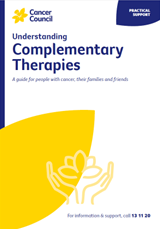- Home
- About Cancer
- Living well
- Complementary therapies
- Making informed decisions
- Can I help myself or should I see a professional?
Can I help myself or should I see a professional?
Why use complementary therapies?
One of the reasons people with cancer use complementary therapies is because it helps them take an active role in their health and wellbeing. However, it is important to discuss ways to manage any symptoms and side effects with your doctors, rather than self-diagnosing.
Some simple ways people can help themselves, without the guidance of a professional, include:
- learning gentle massage or acupressure techniques
- adding essential oils to their bath
- meditating.
Some people may consider self-prescribing herbs or nutritional supplements. Although this may seem like a cheaper alternative, it may not be safe.
Why see a professional therapist?
The benefits of seeing a professional complementary therapist are that they:
- are qualified in the therapy or medicine you are considering
- have an objective view of your case
- may be experienced in treating a range of conditions and have treated other people with cancer
- are able to liaise with your cancer specialists, as necessary
- can prepare a tailor-made treatment plan and dispense remedies based on your individual needs, if they are qualified to do so
- can recommend good quality products and how to take them to achieve the desired effect
- can help you avoid the health risks of using complementary therapies that may interact with conventional cancer treatment.
The risks of buying products online
Many websites sell a range of herbs or nutritional supplements that may be less expensive than those you can buy in Australia. However, products purchased from overseas are not covered by the same safety and quality regulations that apply to products sold in Australia.
→ READ MORE: Getting a second opinion
Meditation and Relaxation Podcast
Listen to more of our meditation and relaxation podcast for people affected by cancer
More resources
Dr David Joske, Clinical Haematologist, Sir Charles Gairdner Hospital and PathWest, Chairman and Founder Solaris Cancer Care Foundation, Clinical Professor of Medicine, The University of Western Australia, WA; Australasian Integrative Medicine Association (AIMA); Dr Robert Blum, Clinical Director, Cancer Services, Bendigo Health, NSW; Sally Brooks, Senior Pharmacist, Medicines Information, Peter MacCallum Cancer Centre, VIC; Dr Suzanne Grant, Senior Research Fellow, NICM Health Research Institute, Western Sydney University, and Chris O’Brien Lifehouse, NSW; Prof Danforn Lim, Adjunct Professor and Advisory Board Member, NICM Health Research Institute, Western Sydney University, and Adjunct Professor, UTS, NSW; Christina Line, Statewide Services Senior Coordinator, Cancer Council WA; Jen McKenzie, Physiotherapist (Lymphoedema) and ESSA Accredited Exercise Physiologist, The McKenzie Clinic, QLD; Simone Noelker, Wellness Centre and Pastoral Care Manager, Ballarat Regional Integrated Cancer Centre, VIC; Dr Nirzari Pandit, General Practitioner, RACGP Specific Interests Integrative Medicine Group, NSW; Georgie Pearson, Consumer; Cris Pirone, Counsellor, Cancer Council SA; Dr Elysia Thornton-Benko, Specialist General Practitioner, and UNSW Research Fellow, NSW; Kirsty Trebilcock, 13 11 20 Consultant, Cancer Council SA.
View the Cancer Council NSW editorial policy.
View all publications or call 13 11 20 for free printed copies.

